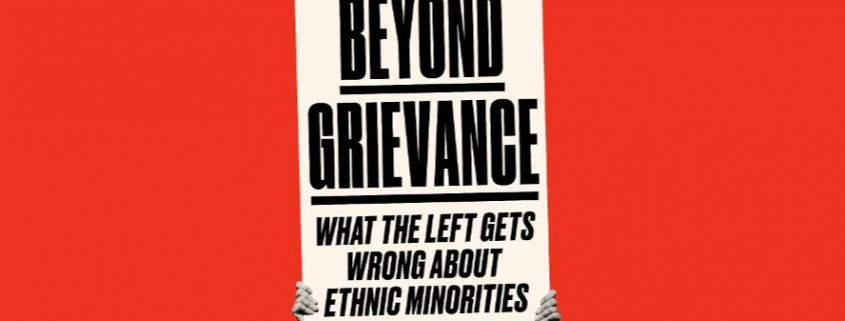Book review: ‘Beyond Grievance: What the left gets wrong about ethnic minorities’
Graeme Kemp proclaims Rakib Ehsan’s book as an invaluable contribution to the debate about race and identity politics in the UK today.
Rakib Ehsan has written a radical, blistering attack on much of the contemporary left in UK politics. In Beyond Grievance he analyses, and dismisses, much of the identitarian thinking and arguments of Critical Race Theory dominant among the left today. He seeks to provide an explanation for differences in ethnic success rates in areas such as education that is more sophisticated and nuanced than much of what passes for political debate today. While the leadership of Labour seems more interested in overgeneralised explanations of structural and institutional racism, Ehsan explores how such factors as strong family structures and a positive attitude to education, for example, may also play a role.
As an old-school leftist who blends a strong sense of social justice with a fulfilling, family-orientated traditionalism, I – like many former Labour voters in Britain – think that the modern left is threatening to turn a once-great party into an amateurish pressure group that is in thrall to a divisive and unpopular identity politics. (p18)
Readers may have different views of the Labour Party – but Beyond Grievance is a dramatic intervention in current political debates about identity, and opportunity, in the UK. Indeed, while supportive of social-democratic politics, and the politics of class, Rakib is merciless in taking apart the views of many recent Labour MPs. Too many of these MPs, he says, have displayed a mixture of racial identity politics and an unjustified political cynicism. The era of Jeremy Corbyn’s leadership is seen as mired in this kind of thinking.
The result of making racial identity politics, and its underlying assumptions, so central to its mission has resulted in a mediocre Labour party, with links to unaccountable identitarian political groups. So, what is the issue here that Labour, arguably, gets wrong? Rakib Ehsan explains that ‘the worry is that Labour tends to “racialise” any crisis under the sun – and the pledge to introduce a new Race Equality Act…is a classic example of how left-wing identitarianism has infected Labour’s policy-making processes’. (p78/79)
The likelihood is that any new legislation will endorse ideas of ‘equity’ that are based on Critical Race Theory. Equality of outcome is emphasised over equality of opportunity; racism is suspected, and often proclaimed, as the explanation for any differences in success rates of ethnic groups. Equity theory is already creating strange policy interventions in the USA that we don’t need here either, he says.
While very aware that the battle against prejudice in the UK is not yet over, Ehsan seeks a more sophisticated explanation of social differences in the UK today. He remains sceptical of ideas such as ‘white privilege’, unconscious bias and ‘allyship’ (rather than traditional radical notions of solidarity, for example). He is dismissive of ‘inclusion professionals’ in NHS and education bureaucracies – and positive about the work of Don’t Divide Us. Critical Race Theory is just too crude, simplistic and divisive to help us.
So, what inequalities are there in the UK? There is variety even within the homogenous block labelled ‘white’. On a range of social and economic indicators, ‘Irish Brits’ (p35) are doing better than the white-British mainstream, for example, in areas such as hourly pay and education. This is not the case with the UK’s Traveller communities though. Indeed, white men in general have lower rates of life expectancy and higher rates of suicide compared to others in society. The picture is more complex than ‘white privilege’ theory would suggest. Many coastal and former industrial towns have seen the decline of the family and local communities, with poverty rife in the working-class areas of Midlands and North.
Often the success of ethnic minorities in the UK is understated. Ehsan produces some startling facts about the incredible success of Britain’s Chinese-origin communities. Consider this:
[T]he 2020-21 average ‘Attainment 8’ score for Chinese-heritage pupils in England receiving special educational needs (SEN) support was 55.8 – higher than the corresponding figure for the entire pupil population with no identified special educational needs (54.5). (p185)
Indeed, Ehsan sees the value placed on education and effort in Chinese-origin communities as being significant in this success story. This really is remarkable. He also emphasises the high-performance of many British Indians, who often have a similar respect for education and family stability. Ehsan praises the culture of personal responsibility, individual initiative and self-sufficiency found in British-Indian communities: hard-work and education produce results! He has little time for the racial grievance industry: ‘The vast majority of British Indian families … have no time for any kind of mental slavery.’ (p183)
When it comes to school exclusions, he explains that there is a variety of different exclusion rates. For example, in the period 2018 -2019 the temporary exclusion rates for black-African-origin pupils was lower (4.1 per cent)than white British mainstream (6 per cent). However, for black-Caribbean heritage pupils the temporary exclusion rate was higher than both groups, at 10.7 per cent. This is the kind of nuanced and detailed analysis often missing in grievance-based analysis that fails to see differences even with classifications such as BAME (a term fading from use, anyway).
Rakib Ehsan’s enthusiasm is for a positive, aspirational Labour party that appreciates the complexity of life for different groups in the UK – and the positive, cohesive effect of faith and religion in society. Labour must appreciate that the success of many minority groups is due to religion, as well as family, he says. Labour should support the success of stable family structures.
Of course, not everyone may agree with mixing politics with religion in quite so close a way, nor placing so much significance on the family, rather than say, living in cohesive communities that make space and encourage neighbourliness. But the fact is that neglecting such factors led all major parties to adopt policies and hold views that are greatly removed from the views and interests of the majority of citizens they are meant to represent.
Ultimately, claims Ehsan, politicians on the Left (as well as the Right) need to understand that minority groups are not always the victims of this vague thing called structural racism – and often have achieved real success. There is still racism, as the author acknowledges, but a divisive, pessimistic analysis based on core tenets of Critical Race Theory is unhelpful for developing an alternative vision.
This is how the contemporary British left can become a truly relevant force among patriotic, community-spirited, family-orientated ethnic minorities who are appreciative of the opportunities, freedoms and protections of British democracy. It is how they move beyond the politics of grievance.’ (p215)
Rakib Ehsan’s book is a remarkable contribution to debates in the area of culture and identity politics today.
Graeme Kemp is a former civil servant and teacher who has worked in different roles in education from the south-coast of England to Scotland. As well as ‘Don’t Divide Us’ he has contributed reviews to the ‘Equiano Project’. He is proud to currently live in the Midlands.


